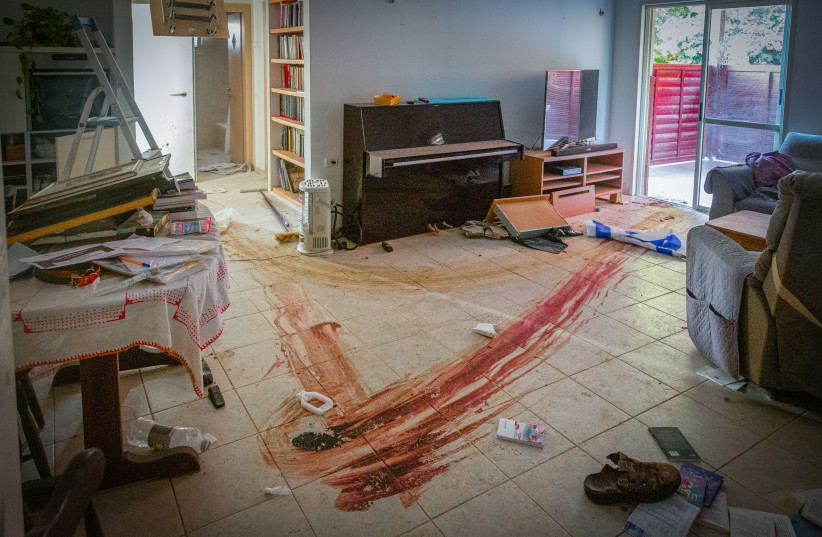It would be an understatement to claim that the last 60 days have been cataclysmic for Israel.
Sixty days since the morning of infamy exploded, so unfathomable, so unbelievable, so abhorrent, that we can’t even name it. The October 7 massacre, Black Sabbath, the Simchat Torah massacre, Shabbat Shachora – none of them does justice to the sheer horror of what went down that day, and what’s gone down since.
The raw numbers don’t tell the story either: 1,200 slaughtered in the murderous one-day rampage; 240 captured, kidnapped, and held hostage in Gaza; some 140 released in a one-week span that saw every grocery store run out of Kleenex; thousands of rockets fired upon cities throughout the country; 80 soldiers killed so far in the ensuing war that Israel launched, and thousands of Palestinians killed in Gaza.
It’s been 60 days of not being able to catch our breath.
Between the initial shock and outrage in the face of one wave after another wave of funerals, stories of horror and heroism from the southern communities and the rave gathering that were brutally attacked, increasingly revolting disclosures from released hostages of depravity, torture, and atrocities, and eulogies for the soldiers who have fallen since October 7, there hasn’t been time to process, to comprehend, and to contextualize.
Israel is not a country in post-trauma. It’s a country in trauma. And after 60 days, there are no signs that we’ll be getting better any time soon.
Families have been torn apart by death and destruction – there’s virtually nobody in the country who doesn’t have some connection with one of the victims of October 7 and since.
Thousands of Israelis have been displaced from their homes in the South and the North, forced to live a temporary gray existence in some cruel existential limbo. Others have suffered financial hardships and even ruin amid shuttered businesses and the collapse of tourism, and thousands of others, called up in Tzav 8, have barely been home in two months, stretching the mental and physical resources of those remaining back home to the limits.
Yet.. yet… yet… we have not been broken. On the contrary, amid a gaping distrust of the leaders – both in government and the military – who enabled the October 7 massacre to unfold, the people have picked up the gauntlet in an inspirational display of determination and resilience (hosen, winning the award for most repeated Hebrew word over the last 60 days).
Providing for the displaced, volunteering to make food for soldiers and donating clothes, equipment, and offering social services and psychological help pro bono, the best of Israel has emerged over the last 60 days. Literally half the population volunteers. It’s a shame that it took a tragedy of such immense proportions to jump start our common sense of purpose.
Sixty days in and none of us knows where this war is heading. Can anyone predict whether Hamas will be toppled or at least left toothless? Likewise, will they be weakened enough to agree to another pause that will enable more of the hostages to be released?
The internal split on how these aims should be achieved threatens to open up the pre-war divides sparked by the government’s tone-deaf proposed judicial reform.
And the international community, including Israel’s staunchest ally, the United States, led by a president who has given the country unprecedented support as well as a personal visit and hug, is going to increase its pressure on the government to finish the war, whether the intended results are achieved or not.
As frantic, nerve-wracking, and grief-filled as these 60 days have been, there’s no guarantee that the next 60 days will see a respite. In fact, all indications point to a prolonged and bloody campaign in southern Gaza to uproot Hamas.
But even if the war ends tomorrow, Hamas surrenders, the hostages come home, and the people of Gaza are able to rebuild their lives without the burden of an oppressive terrorist regime over their heads, Israel will never be the same. October 7 took something away from all of us that can never be retrieved.
Yes, coffee culture and nightlife will once again flourish, hi-tech investments will rebound, and tourists will once again fill the empty sites throughout the country. But it will all take place through the prism of October 7.
The next 60 days will put Israelis to a test that October 7 has prepared them for. We’ve learned that we have only ourselves to rely on – not other countries, not our government. Perhaps it was about time we learned that lesson, a part of a country growing up. But, if so, it was an awfully steep price to pay for such knowledge.

